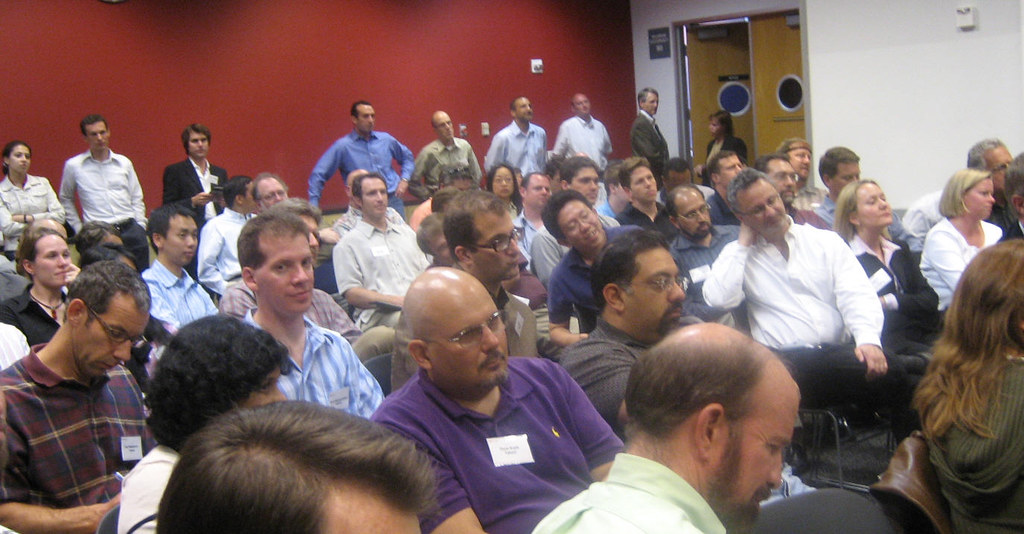In a world driven by individualistic pursuits, it is easy to overlook the immense power that lies within the collective wisdom of the masses. While it may seem counterintuitive, the notion that a group of people can possess a deeper understanding or make more accurate predictions than a single expert has been proven time and time again. In this article, we delve into the thought-provoking insights drawn from James Surowiecki’s renowned book “The Wisdom of Crowds.” Highlighting the potential of collective wisdom to shape businesses, politics, and society at large, we invite you to explore the compelling evidence that supports harnessing the power of many minds for greater innovation and decision-making. Prepare to challenge conventional wisdom and embrace the limitless capabilities of group intelligence.

Harnessing the Power of Collective Wisdom: Understanding the Foundations of “The Wisdom of Crowds”
The Wisdom of Crowds is a fascinating concept that highlights the remarkable potential of collective wisdom. By tapping into the knowledge, opinions, and diverse perspectives of a group, we can harness a power that far exceeds the abilities of any individual. This idea is rooted in the belief that when a diverse group collaborates and shares their insights, it can provide more accurate and valuable solutions than a single expert or authority.
One of the foundational principles behind the Wisdom of Crowds is the idea that the errors and biases of individual members tend to cancel each other out, resulting in a more accurate collective judgment. This occurs due to the diversity of opinions and the different approaches taken by individuals when making decisions. As a result, the collective intelligence of the group emerges, enabling it to solve complex problems, make predictions, and generate innovative ideas.
- Shared knowledge: The Wisdom of Crowds leverages the collective knowledge of a group, ensuring a broader scope of information and insights.
- Diverse perspectives: By incorporating diverse perspectives, the Wisdom of Crowds helps to uncover blind spots and biases that may go unnoticed by an individual.
- Aggregate judgment: Through the aggregation of individual judgments, the Wisdom of Crowds arrives at a more accurate and reliable outcome.

Exploring the Key Insights from “The Wisdom of Crowds”: How Collective Intelligence Surpasses Individual Expertise
Unlocking the potential of collective intelligence has become increasingly vital in our complex and interconnected world. In “The Wisdom of Crowds,” author James Surowiecki presents a compelling case for the power of collective decision-making and highlights the surprising ways in which it often outperforms individual expertise. This groundbreaking book offers valuable insights into the dynamics of groups, challenging traditional notions of authority and expertise.
One of the key takeaways from Surowiecki’s work is the idea that diverse groups tend to make more accurate predictions and better decisions compared to individuals or homogeneous groups. Through extensive research and compelling examples, he demonstrates how a collective, made up of individuals with different perspectives, knowledge, and biases, can pool their insights and arrive at remarkable results.
- Collective intelligence harnesses the wisdom of diverse perspectives, leading to more comprehensive and robust outcomes.
- Groups with varied backgrounds and expertise are often better at problem-solving and generating innovative ideas.
- Individual biases and errors tend to cancel each other out within a diverse crowd, resulting in more reliable judgments.
In conclusion, “The Wisdom of Crowds” challenges our preconceived notions about decision-making and highlights the immense potential of collective intelligence. By tapping into the diverse knowledge and perspectives of a group, we can unlock innovative ideas and make better-informed choices. Surowiecki’s thought-provoking work serves as a reminder that collaboration and inclusivity are essential ingredients for tackling complex problems and achieving success in a rapidly changing world.
Applying the Principles of Collective Wisdom: Practical Recommendations for Crowdsourcing Success
Practical Recommendations for Harnessing Collective Wisdom
Crowdsourcing has revolutionized how organizations approach problem-solving, innovation, and decision-making. By tapping into the collective intelligence of diverse individuals, the potential for groundbreaking ideas and solutions is unparalleled. However, achieving success in crowdsourcing initiatives requires careful planning and execution. Here are some practical recommendations to maximize the benefits of collective wisdom:
- Foster a Culture of Collaboration: Encourage open communication and collaboration among participants. Create a supportive environment where diverse perspectives are valued, fostering constructive discussions and idea exchange.
- Set Clear Objectives: Clearly define the problem or challenge you seek to address through crowdsourcing. Communicate precise goals and desired outcomes to provide focus and alignment to participants, ensuring their efforts are channeled effectively.
- Engage a Diverse Crowd: Cast a wide net when seeking contributors to ensure a broad range of experiences, perspectives, and expertise are represented. Diversity stimulates creativity and enhances the quality of solutions generated.
- Establish Transparent Processes: Be transparent about the decision-making process, evaluation criteria, and how participants’ contributions will be used. Transparency fosters trust and encourages greater participation.
In addition, it is crucial to provide timely feedback and acknowledge the contributions of participants. Celebrating successes and showing gratitude for their valuable input inspires continued engagement and fosters a sense of ownership among participants. By applying these recommendations, you can unlock the full potential of collective wisdom, leading to more innovative solutions and a competitive edge in today’s rapidly evolving world.
Unleashing the Potential of Collective Wisdom: Overcoming Challenges and Maximizing the Benefits
When it comes to navigating complex problems and unlocking innovative solutions, the power of collective wisdom cannot be underestimated. Harnessing the diversity of knowledge, experiences, and perspectives can lead to groundbreaking insights and transformative breakthroughs that may not have been possible through individual efforts alone. However, to truly unleash the potential of collective wisdom, we must confront and overcome the challenges that often stand in our way, while also maximizing the abundant benefits this collaborative approach offers.
One of the primary challenges we encounter is the lack of effective communication and collaboration among team members. Encouraging open dialogue, active listening, and respectful debates is essential to harnessing the wealth of expertise within a diverse group. By establishing an inclusive environment where everyone feels comfortable sharing their insights, we create a solid foundation for collective wisdom to thrive. Additionally, fostering an atmosphere of trust and psychological safety helps to overcome barriers and encourages individuals to take risks, present innovative ideas, and challenge the status quo.
- Cultivating a Culture of Collaboration: Building a culture that promotes collaboration is crucial. Setting clear expectations, providing tools and resources, and recognizing and valuing the contributions of each team member creates an environment where collective wisdom can flourish.
- Nurturing Diversity: Embracing diversity in all its forms, including background, expertise, and perspectives, is key to tapping into the full potential of collective wisdom. Encouraging diversity allows for a wider range of ideas and approaches, leading to more comprehensive and innovative solutions.
- Establishing Effective Facilitation: Appointing skilled facilitators who can guide discussions, manage conflicts, and ensure equitable participation is vital. A skilled facilitator can help navigate through disagreements, facilitate consensus-building, and keep the focus on the common goal.
Insights and Conclusions
In a world where complex problems seem insurmountable, tapping into the collective wisdom of the masses may hold the key to unlocking innovative solutions. “The Wisdom of Crowds” by James Surowiecki explores this thought-provoking concept, leaving us with a profound understanding of the power that lies within collective intelligence. As we reach the end of this journey through the insightful pages of Surowiecki’s work, one cannot help but be captivated by the potential and importance of harnessing the wisdom of crowds.
Throughout the article, we have uncovered numerous examples of situations where a group’s collective intelligence outperforms the knowledge of any individual expert. Be it predicting election outcomes, estimating the weight of an ox, or solving complex scientific problems, the diverse perspectives and knowledge pooled together by a crowd often lead to astonishingly accurate results. Surowiecki’s meticulous analysis of these phenomena leaves no room for doubt – collective wisdom possesses an incredible capacity to overcome limitations and provide solutions that are far superior to what we could achieve individually.
Moreover, the author expands on the conditions necessary for wisdom to emerge within a crowd. He emphasizes that diversity, independence, and decentralization are crucial factors that influence the quality of collective decision-making. When individuals freely express varied perspectives, unaffected by groupthink or undue influence, the smorgasbord of ideas fostered by open discussion enables the group to rise above biased or flawed reasoning. It is precisely in this environment that the aggregate opinion of the crowd is most likely to manifest the golden qualities of true wisdom.
Perhaps the most captivating aspect of “The Wisdom of Crowds” is its application to real-life scenarios. Surowiecki skillfully illustrates how organizations, governments, and societies can harness collective intelligence to drive progress and solve intricate problems. By opening up channels of communication and actively seeking diverse inputs, we can forge a roadmap towards finding innovative solutions and shaping a better future for all. The power of collective wisdom lies not only in its potential for transformative change but also in its ability to foster cooperation and promote unity among diverse groups.
As we bid farewell to the enlightening insights provided by Surowiecki, we cannot underestimate the importance of this collective intelligence revolution. The time has come to shift our paradigms and embrace the potential of diverse perspectives coming together to solve the world’s most pressing challenges. By harnessing the power of collective wisdom, we can break free from the limitations of individual thinking and unlock a world of boundless possibilities. Let us embark on this promising journey together, where the shared knowledge, experiences, and insights pave the way for a future shaped by the collaborative brilliance of the masses.
The concept of collective wisdom has long been discussed in philosophical, economic, and social scientific circles. However, it leaves some scientists and politicians unsure. Is collective wisdom a genuine phenomenon or is it merely a thing of myth?
In the groundbreaking book “The Wisdom of Crowds”, author James Surowiecki proposes the theory of collective intelligence as a legitimate phenomenon. He draws on numerous historical and contemporary examples ranging from stock markets to art auctions to show how collective intelligence yields powerful results.
One of the central arguments of Surowiecki’s book is that decision-making can often be improved if it is based on collective knowledge rather than individual expertise. The author suggests that reaching a consensus by considering a large number of diverse opinions often results in better decisions than are achievable by relying on a single authoritative opinion. He uses the example of the U.S. National Weather Service to illustrate this concept. By pooling the opinion of amateurs and experts, the service is able to gain insights that would be impossible for any single individual to deduce.
In “The Wisdom of Crowds”, Surowiecki makes the case for the value of collective intelligence. He emphasizes that collective knowledge should be diversified, independent, and decentralized in order for it to be most effective. Collective knowledge is at its strongest when it is heterogenous, meaning it is made up of a variety of opinions, perspectives, and backgrounds. Additionally, Surowiecki argues that each individual’s opinion should be independent in order to avoid influence from “pushed opinions” or conspiracy theories. Finally, he emphasizes that collective knowledge should be decentralized in order to avoid information overload or manipulation.
Ultimately, Surowiecki advocates the importance of utilization of collective wisdom in order to make better decisions. He challenges the idea that expertise or an individual’s opinion holds more value than collective intelligence, and urges governments, businesses, and other institutions to utilize collective knowledge whenever possible. In doing so, organizations could become more efficient and effective in their decision- making processes, potentially resulting in improved outcomes in various domains.

